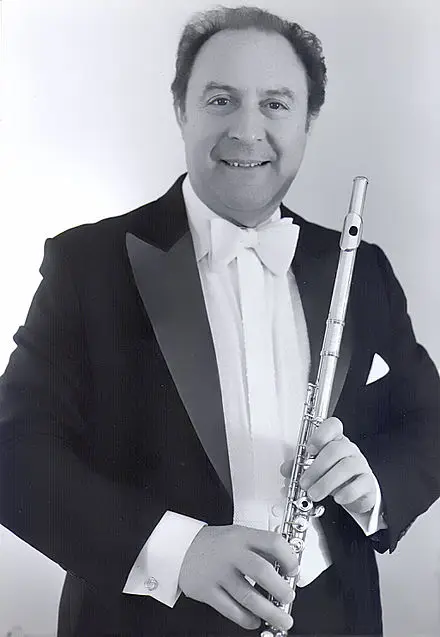
Jean-Pierre Rampal (1922 – 2000)
Jean-Pierre Rampal was a pioneering French flutist celebrated for revitalizing the flute as a solo instrument and expanding its repertoire with his virtuosic skill and extensive recordings.
Early Life and Musical Training
Jean-Pierre Rampal was born on January 7, 1922, in Marseille, France. He came from a musical family; his father was a flutist and a professor at the Marseille Conservatoire. Initially, Rampal followed a path towards medicine, but the outbreak of World War II and his subsequent enlistment interrupted his studies. After the war, he decided to devote his life to music, studying flute at the Paris Conservatoire under the tutelage of Gaston Crunelle.
Rise to Prominence
Rampal’s professional career began in earnest after he graduated from the conservatoire with first prize in 1944. He quickly gained a reputation as an exceptional flutist, known for his bright tone and impeccable technique. Rampal became the first flutist to establish a successful career as a soloist, at a time when the flute was primarily considered an orchestral or ensemble instrument. His debut in Paris in 1947 marked the start of a series of performances that would eventually propel him to international stardom.
International Career and Collaborations
Jean-Pierre Rampal’s international career took off in the 1950s and 1960s as he toured extensively across Europe, the United States, and Asia. He was known for his broad repertoire, which included Baroque pieces as well as contemporary works, many of which were composed specifically for him. Rampal’s collaborations were diverse, spanning genres and including performances with other classical musicians, jazz artists like Claude Bolling, and even popular music figures.
Recordings and Legacy
Over his lifetime, Rampal made hundreds of recordings, including some of the first stereo recordings of the flute repertoire. His discography covers a vast range of styles, from the complete flute sonatas of J.S. Bach to contemporary pieces. His efforts to record and promote lesser-known works revitalized interest in the flute as a solo instrument and inspired a new generation of flutists.
Jean-Pierre Rampal’s impact on the world of flute playing and classical music is profound. He is often credited with almost single-handedly reviving the popularity of the flute as a solo concert instrument. His recordings continue to be highly regarded for their technical excellence and expressive depth.
Importance to Music
Jean-Pierre Rampal’s significance in the music world extends beyond his virtuosic skill and extensive discography. He changed the perception of the flute and opened the door for future soloists. His engaging performance style and dedication to expanding the flute’s repertoire have left an indelible mark on classical music. Rampal passed away on May 20, 2000, but his legacy endures through the many recordings he left behind and the countless flutists he inspired.
Jean-Pierre Rampal remains a towering figure in the history of flute music, celebrated not only for his exceptional musicality but also for his role in transforming the flute into a solo instrument of significance on the classical music stage.
Birthday of Jean-Pierre Rampal

